初中英语情景交际题演示教学
- 格式:doc
- 大小:21.25 KB
- 文档页数:10


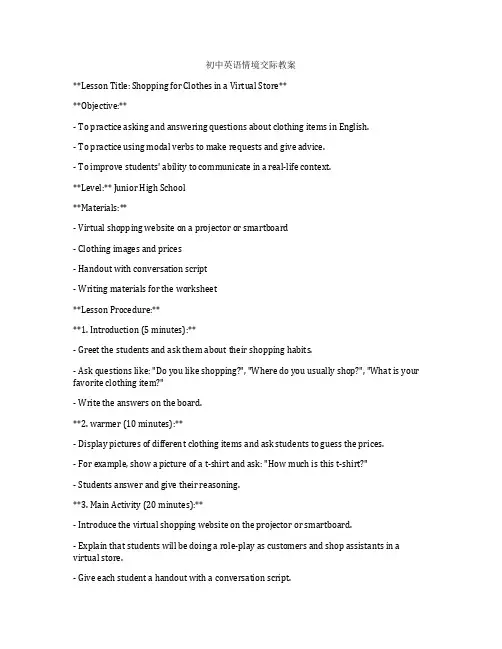
初中英语情境交际教案**Lesson Title: Shopping for Clothes in a Virtual Store****Objective:**- To practice asking and answering questions about clothing items in English.- To practice using modal verbs to make requests and give advice.- To improve students' ability to communicate in a real-life context.**Level:** Junior High School**Materials:**- Virtual shopping website on a projector or smartboard- Clothing images and prices- Handout with conversation script- Writing materials for the worksheet**Lesson Procedure:****1. Introduction (5 minutes):**- Greet the students and ask them about their shopping habits.- Ask questions like: "Do you like shopping?", "Where do you usually shop?", "What is your favorite clothing item?"- Write the answers on the board.**2. warmer (10 minutes):**- Display pictures of different clothing items and ask students to guess the prices.- For example, show a picture of a t-shirt and ask: "How much is this t-shirt?"- Students answer and give their reasoning.**3. Main Activity (20 minutes):**- Introduce the virtual shopping website on the projector or smartboard.- Explain that students will be doing a role-play as customers and shop assistants in a virtual store.- Give each student a handout with a conversation script.- Pair students up and assign them roles.**4. Role-play (20 minutes):**- Instruct students to take turns扮演ing a customer and a shop assistant.- Give them a scenario, for example: "You are in a virtual store looking for a dress. You want to know the price, material, and size availability. The shop assistant will help you with your query."- Monitor their conversations and provide feedback.**5. Worksheet (15 minutes):**- Hand out a worksheet with a list of clothing items and their prices.- Ask students to write a short dialogue between a customer and a shop assistant, using the clothing items and prices given.- Encourage them to use modal verbs like "can", "could", "may", and "must" in their conversations.**6. Sharing and Feedback (10 minutes):**- Ask students to read their dialogues out loud and provide feedback on each other's work. - Encourage them to correct any mistakes and suggest improvements.**7. Revision (10 minutes):**- Review the key phrases and vocabulary used in the role-play.- Practice asking and answering questions about clothing items.**8. Closure (5 minutes):**- Ask students to reflect on what they learned in today's lesson.- Encourage them to practice their English conversation skills with their friends and family. **Note:** The above scenario can be adjusted according to the level and needs of the students. The virtual shopping website can also be replaced with a real-life shopping scenario if desired.。
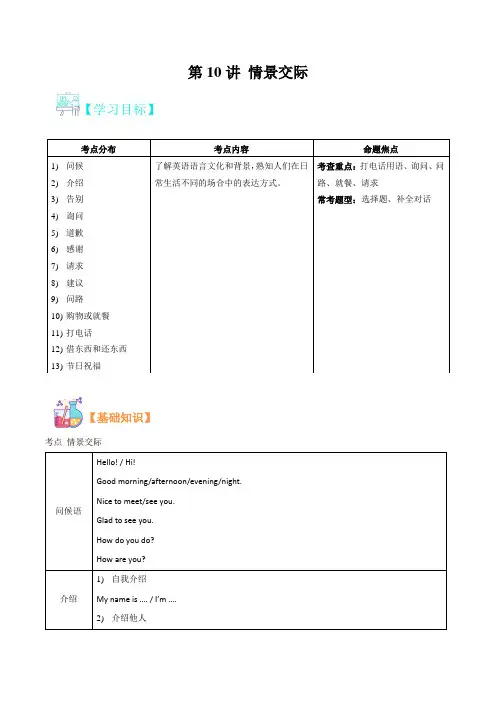
第10讲情景交际【学习目标】【基础知识】考点情景交际问候语Hello! / Hi!Good morning/afternoon/evening/night. Nice to meet/see you.Glad to see you.How do you do?How are you?介绍1)自我介绍My name is …. / I’m ….2)介绍他人考点分布考点内容命题焦点1)问候2)介绍3)告别4)询问5)道歉6)感谢7)请求8)建议9)问路10)购物或就餐11)打电话12)借东西和还东西13)节日祝福了解英语语言文化和背景,熟知人们在日常生活不同的场合中的表达方式。
考查重点:打电话用语、询问、问路、就餐、请求常考题型:选择题、补全对话Shall we …?Can you tell me more about …?建议Please don’t …. Be careful.Why don’t you …? You should stop ….问路Excuse me, where is …? Where can I find …?Can you tell me the way to …?购物或就餐Can I help you?What can I do for you?I’d like….What/How about…?May I take your order now? What would you like for dessert? What would you like to eat/drink?打电话-May I speak to …? / This is … speaking.-Speaking. / Please hold on, …, it’s for you. Is … there?Who is calling, please?借东西和还东西May I borrow your …? / Can you lend me your …? Here is your ….节日祝福Merry Christmas (to you)!Happy New Year (to you)! / Happy Chinese New Year! Happy Children’s Day!Happy birthday (to you)!【考点剖析】考点1、打电话用语﹣Hello!May I speak to Nancy,please?﹣____.()A.Sorry,I don't know.B.Yes,here you are.C.This is Nancy speaking.考点2、询问的用语你想知道你朋友的爸爸的工作,你可以问()A.What's your father's job?B.Who is he?C.Is this your father?考点3、问路的用语问路时,作为文明的小学生你会选择下面哪句话来问路()A.Excuse me.Where is the cinema,please?B.Where is the cinema?C.Where is the bus?考点4、就餐用语﹣____ ﹣A sandwich,please.()A.Do you have a sandwich?B.What would you like to drink?C.What would you like to eat?考点5、请求的用语当你向别人求助时,可以说()A.Let me help you.B.Can I help you?C.Can you help me?【真题演练】1.﹣Nice to meet you.﹣_______.()A.Thank you B.Not bad C.Nice to meet you,too2.当你把Amy介绍给Wu Binbin时,你应该说________()A.Hello,Amy.B.This is Wu Binbin.C.Wu Binbin,this is Amy.3.﹣Goodbye,Mingming.﹣____________()A.Hi.B.Bye﹣bye.C.Good morning. 4.﹣What time do you usually get up?﹣I usually get up at_______.()A.6:30 p.m.B.8:30 a.m.C.8:30 p.m.5.Sarah不小心踩到了别人的新鞋子,她会说________________()A.Hello!B.Thanks.C.Sorry.6.﹣﹣﹣You're beautiful! ﹣﹣﹣____()A.OK!B.Thank you.C.Sure.7.﹣Mum,I'm hungry.﹣Sure.Here you are.()A.I'd like some juice.B.Can I have some eggs?C.I like milk.8.﹣Let's play a game!﹣()A.Thank you.B.Goodbye!C.Great!9.﹣Excuse me.How do I get to the flower shop?﹣()A.Walk along Winter Street and turn right.B.Kitty is on Winter Street.C.I want to go to the post office.D.Is that right?10.﹣_______﹣Yes.These shoes are nice.Can I try them on?()A.Excuse me!B.Can I help you?C.Are they OK?11.What do you have for breakfast?()A.Bread and milk B.football C.books 12.﹣Hello!May I speak to Nancy,please?﹣____.()A.Sorry,I don't know.B.Yes,here you are.C.This is Nancy speaking. 13.At the Spring Festival,we say," "()A.Merry Christmas!B.Happy New Year!C.Hooray!【过关检测】一.选择题1.初次与陌生人相遇,该如何打招呼?()A.How are you?B.Nice to meet you!C.Hello! 2.Hello! _______Chen Jie.﹣Hello ,Chen Jie !()A.I am B.This is C.My name is3.﹣Can you help me,please?﹣.()A.Sure.B.Yes,I can't.C.No,I'm not.4.﹣I am very sorry,but I can't help you now.()﹣______.A.That's right B.You're welcome C.Thank you all the same5.﹣I'm sorry I can't help you.()﹣_________.A.Not at all B.You are welcome C.It doesn't matter 6.如果你告诉对方不应该那么做,你会说:__________()A.You won′t do that.B.You didn′t do that.C.You shouldn′t do that. 7.﹣Hey,I'll go to Hawaii this summer holiday! ﹣_____()A.Of course!B.Have a good time!C.Yes,you are. 8.当你想知道字典的价钱时,问()A.Have you got a dictionary?B.How much is the dictionary?C.I like this dictionary.9.在打电话时,你想问"我可以和Li Shan通话吗?"应该怎样说()A.May I speak to Li Shan?B.Are you Li Shan ?C.Is she Li Shan?10.﹣_____,where is the post office?()A.Thanks B.Nice to meet you C.Excuse me 11.—What day is it today?()—__________A.It's fine.B.It's Tuesday.C.It's windy. 12.﹣What time is it?()﹣It's ________.A.twelve B.OK C.a dog13.﹣When are you going to Hong Kong?﹣()A.This weekend.B.Last week.C.Yesterday. 14.﹣﹣_______________?﹣﹣I'd like some bananas and apples.()A.What's your favorite food?B.What do you have four lunch?C.What would you like for lunch?15.如果你想知道如何到达电影院,应该怎么问?()A.Where is the cinema?B.How can I get to the cinema?C.How do you go to the cinema?16.你想知道新朋友Amy来自哪里,你可以这样问()A.Where are you from?B.Who are you?17.当你朋友问你"你想喝什么?" 你朋友会说:()A.What would you like to eat?B.What would you like to drink?18.如果你是售货员,见到顾客时,你应该说()A.Can I help you?B.How do you do?19.想知道Mike是怎样来上学的,你问()A.How did you come to school?B.How did you go to school?20.你想知道Amy的理想职业,你问他()A.What are you going to be?B.What did you do?21.—____ —Yes,I want a pair of shoes.()A.Can I help you?B.What wrong with you?C.How are you ?22.—_________()—I'm OK.A.Are you all right?B.Where did you go?C.How was the beach?23.想问Mike昨天做了什么,你可以这样问:______________()A.What did you do yesterday,Mike?B.What are you doing,Mike?C.What do you do on the weekend,Mike?24.你想知道Amy有多高,你可以这样问:____________()A.How are you,Amy?B.How old are you,Amy?C.How tall are you,Amy?25.老师想问小丽为什么上学迟到时应该说()A.You are late.B.Why are you late,Xiaoli?C.Because the bus was late.26.你想知道你的朋友Jenny昨晚做了什么,你会问她()A.What did you do last night,Jenny?B.What did Jenny do last night?C.I watched TV. 27.当你想要用一下同桌的钢笔时,你可以说()A.Can I help you?B.Can you write in English?C.Can I use your pen,please?28.当你想知道对方的名字时,你可以问()A.What's this?B.What's your name?C.How old are you?29.当你想问"你多大了?",应该怎样说()A.How are you?B.How old are you?C.How do you do?30.你想问别人打算做什么,可以这样问:___________()A.Where are you going to stay?B.What are you going to do?C.How are you going there?二、在Ⅱ栏中选出与Ⅰ栏中相应的答语I Ⅱ(1)What's your telephone number,please?_______A.He is a worker.(2)It's very cold today,isn't it?B.It doesn't matter.(3)Can you mend it?C.Yes,wonderful,thanks.(4)How is your mother?D.Sometimes.(5)Hi,this is my friend,Lily.E.My telephone number is 6262383.(6)I'm sorry to trouble you.F.Yes,it is.You need to wear warm clothes.(7)How often do you go to the park?G.Certainly.(8)Excuse me.Where is the post office?H.Nice to meet you.(9)What does your father do?I.She is OK.(10)Did you have a good trip?J.It's about twenty meters from here.三、用A,B,C,D,E给下列句子排序A.That's my father's birthday,too!B.I' ll cook noodles for him.C.When is your birthday?D.Cool!What will you do for your dad?E.My birthday is on July 21st.→→→→.第10讲情景交际【学习目标】【基础知识】考点情景交际问候语Hello! / Hi!Good morning/afternoon/evening/night. Nice to meet/see you.Glad to see you.How do you do?How are you?介绍3)自我介绍My name is …. / I’m ….4)介绍他人This is Miss/Mr/Mrs ….考点分布考点内容命题焦点14)问候15)介绍16)告别17)询问18)道歉19)感谢20)请求21)建议22)问路23)购物或就餐24)打电话25)借东西和还东西26)节日祝福了解英语语言文化和背景,熟知人们在日常生活不同的场合中的表达方式。
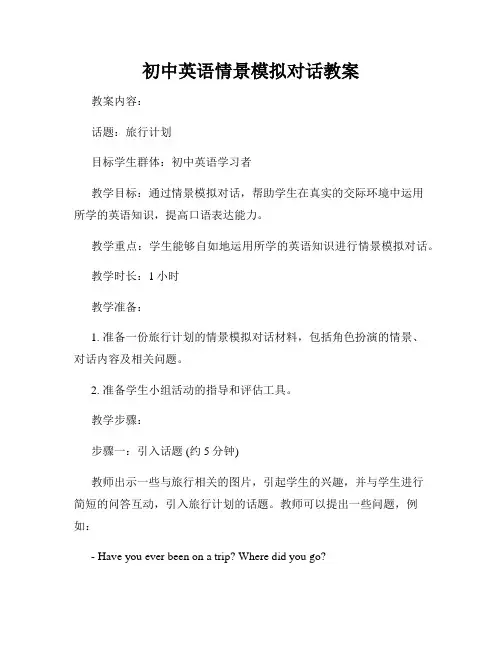
初中英语情景模拟对话教案教案内容:话题:旅行计划目标学生群体:初中英语学习者教学目标:通过情景模拟对话,帮助学生在真实的交际环境中运用所学的英语知识,提高口语表达能力。
教学重点:学生能够自如地运用所学的英语知识进行情景模拟对话。
教学时长:1小时教学准备:1. 准备一份旅行计划的情景模拟对话材料,包括角色扮演的情景、对话内容及相关问题。
2. 准备学生小组活动的指导和评估工具。
教学步骤:步骤一:引入话题 (约5分钟)教师出示一些与旅行相关的图片,引起学生的兴趣,并与学生进行简短的问答互动,引入旅行计划的话题。
教师可以提出一些问题,例如:- Have you ever been on a trip? Where did you go?- What do you think is important when planning a trip?步骤二:角色扮演情景模拟对话 (约15分钟)1. 教师将学生分成小组,每个小组包括2至3名学生。
每个小组有两个角色:旅行者(A)和旅行顾问(B)。
2. 教师分发情景模拟对话材料给学生,让每个小组进行角色扮演。
学生可以在角色扮演之前先熟悉对话内容。
3. 学生进行角色扮演,教师及时给予指导和反馈。
鼓励学生运用所学的英语知识进行沟通和交流。
例子:情景:学生A正在计划一个假期旅行,他找学生B做旅行顾问。
对话内容:A: Hi, I'm planning a vacation and I need some advice.B: Sure, I'd be happy to help. Where are you thinking of going?A: I'm thinking about going to Japan. What do you think?B: Japan is a great choice! When are you planning to go?A: I'm thinking of going during the summer vacation. Is that a good time to visit?B: Yes, summer is a popular time to visit Japan. What are some of the things you want to do there?A: I want to visit Tokyo and Kyoto, and maybe try some traditional Japanese food.B: That sounds like a wonderful plan. I can help you find some attractions and recommend some local dishes.A: Thank you! That would be very helpful.步骤三:小组活动 (约25分钟)1. 学生继续进行小组活动,每个小组可以选择一个新的情景或者继续探索旅行计划的情景。
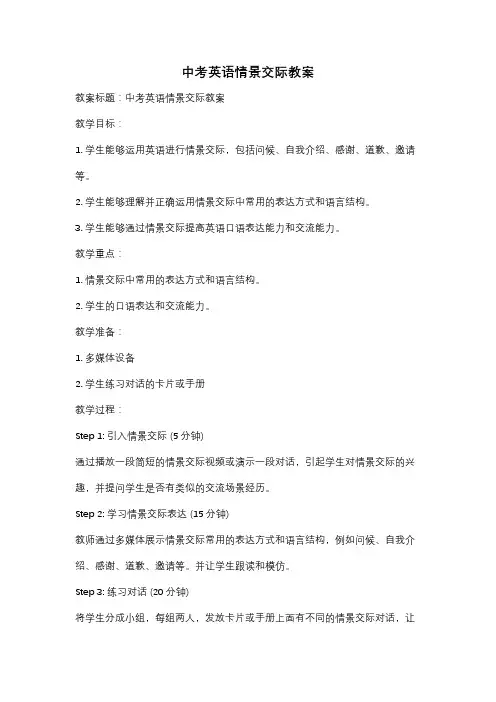
中考英语情景交际教案教案标题:中考英语情景交际教案教学目标:1. 学生能够运用英语进行情景交际,包括问候、自我介绍、感谢、道歉、邀请等。
2. 学生能够理解并正确运用情景交际中常用的表达方式和语言结构。
3. 学生能够通过情景交际提高英语口语表达能力和交流能力。
教学重点:1. 情景交际中常用的表达方式和语言结构。
2. 学生的口语表达和交流能力。
教学准备:1. 多媒体设备2. 学生练习对话的卡片或手册教学过程:Step 1: 引入情景交际 (5分钟)通过播放一段简短的情景交际视频或演示一段对话,引起学生对情景交际的兴趣,并提问学生是否有类似的交流场景经历。
Step 2: 学习情景交际表达 (15分钟)教师通过多媒体展示情景交际常用的表达方式和语言结构,例如问候、自我介绍、感谢、道歉、邀请等。
并让学生跟读和模仿。
Step 3: 练习对话 (20分钟)将学生分成小组,每组两人,发放卡片或手册上面有不同的情景交际对话,让他们进行练习。
教师可以在小组之间巡视,提供帮助和指导。
Step 4: 对话表演 (15分钟)请一些小组上台表演他们练习的对话,其他学生可以进行评价和提出改进意见。
教师也可以给予指导和建议。
Step 5: 情景交际扩展 (10分钟)教师可以提供一些额外的情景交际场景,让学生自行编写对话,并进行表演。
这可以提高学生的创造力和口语表达能力。
Step 6: 总结和反馈 (5分钟)教师对学生的表现进行总结和反馈,强调情景交际的重要性,并鼓励学生在日常生活中多加练习,提高口语交流能力。
Step 7: 作业布置 (5分钟)布置作业,要求学生在家中练习并准备一段情景交际对话,并在下节课上进行表演。
教学延伸:1. 学生可以通过角色扮演的方式进行更多的情景交际练习。
2. 学生可以利用多媒体资源或在线平台寻找更多的情景交际对话进行学习和练习。
教学评价:1. 观察学生在练习和表演中的表现,包括语言表达准确性、流利度和交际能力。
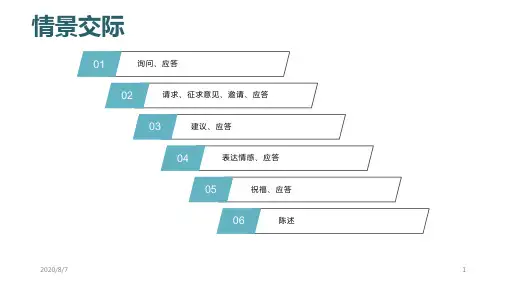


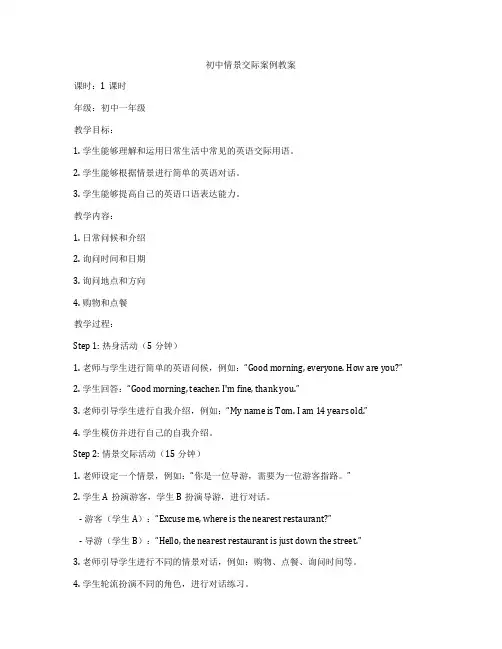
初中情景交际案例教案课时:1课时年级:初中一年级教学目标:1. 学生能够理解和运用日常生活中常见的英语交际用语。
2. 学生能够根据情景进行简单的英语对话。
3. 学生能够提高自己的英语口语表达能力。
教学内容:1. 日常问候和介绍2. 询问时间和日期3. 询问地点和方向4. 购物和点餐教学过程:Step 1: 热身活动(5分钟)1. 老师与学生进行简单的英语问候,例如:“Good morning, everyone. How are you?”2. 学生回答:“Good morning, teacher. I'm fine, thank you.”3. 老师引导学生进行自我介绍,例如:“My name is Tom. I am 14 years old.”4. 学生模仿并进行自己的自我介绍。
Step 2: 情景交际活动(15分钟)1. 老师设定一个情景,例如:“你是一位导游,需要为一位游客指路。
”2. 学生A扮演游客,学生B扮演导游,进行对话。
- 游客(学生A):“Excuse me, where is the nearest restaurant?”- 导游(学生B):“Hello, the nearest restaurant is just down the street.”3. 老师引导学生进行不同的情景对话,例如:购物、点餐、询问时间等。
4. 学生轮流扮演不同的角色,进行对话练习。
Step 3: 小组活动(15分钟)1. 学生分成小组,每组三人。
2. 每组选择一个情景,例如:“你们在一家餐厅点餐。
”3. 学生根据情景编写对话,并表演给其他小组观看。
4. 其他小组观看后,给出反馈和建议。
Step 4: 总结与反思(5分钟)1. 老师引导学生回顾本节课所学的交际用语和情景。
2. 学生分享自己在对话中的收获和困难。
3. 老师给出建议和指导,帮助学生提高口语表达能力。
教学评价:1. 观察学生在对话中的表现,评估他们的口语表达能力和交际能力。
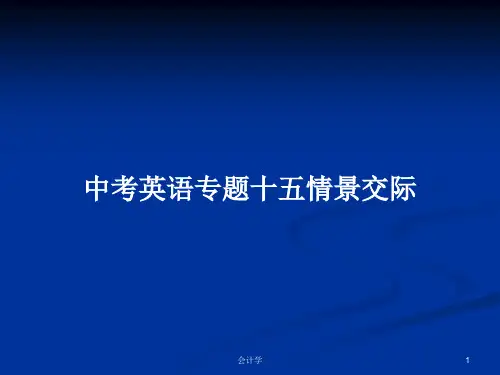
一、问候(Gr eetings)1.—How ar e you,Tom?—I’m.A.wellB.goodC.here2.—Hi,Jack.How’s your f amily?—.A.Fine,thanksB.It’s a big oneC.Not at all3.—How ar e you getting on w ith your classmates?—.I have go t to know them.A.Very w ellB.Much lighterC.Much better4.—Aren’t you tired,M ary?—.I like going shopping.A.Not at allB.I’m so sorryC.Yo u’re welcome5.—What’s your brother like after he lived in A mericaf or about tw o year s?—.A.He likes America v ery muchB.He’d like to stay w ith usC.He isn’t the same as he used to be二、介绍(Intr oductions)1.—How do you do?—A.I’m f ine.B.How are you?C.How do you do?2.—Hi,Jim.This is my brother Bob.—A.How are you?B.Fine,thank you.C.Nice to meet you.3.—Hi,Jim.Nic e to meet you.—.A.Cer tainlyB.Many thanksC.P leased to meet you 4.—Let me introduce myself.I’m John.—.A.With pleasureB.It’s my pleasureC.Pleased to meet you5.—Hello,Tom.This is Jane.S he is a new studenthere.—A.Pleased to meet you.B.Is that Jane?C.I agree w ith you.三、打电话(Making telephone ca lls)1.—Could I speak to Jim G reen,please?—,he isn’t in.A.GoodB.WellC.Sorry2.—Hello.May I speak to Mike?—.Please call back later.A.Wait a minuteB.Hold on f or a momentC.Sorr y,he is out3.—Hello,may I speak to Jim?—.Who’s that?A.S peakingB.SorryC.Good四、祝愿、祝贺和应答(Wishes,congr atula tions andr esponses)1.—Our Chinese f ootball team has the match.—Congratulations.A.w atchedB.joinedC.won2.—Hi,Liu Ying.I’m going to Qingdao f or myholiday w ith my f riends.—.A.Gr eat!Enjoy yourselfB.Congratulations.See you laterC.Well done3.—Have a goo d journey home,David.—A.Thank you.B.You’d better not.C.Well done!初中英语情景交际实战演练湖北金亮湖南陈博2008/7-8中学生英语English J ournal For Middle School Students55--4.—We ’ll have an English exam tomorrow .—.A.Tha t ’s greatB.Good luck to youC.CongratulationsD.Glad to hear that5.—Happy Teachers ’day,Miss Wang.—.A.You are so kindB.I ’m so happyC.Thank you五、道歉和应答(Apologies and r esponses)1.—Jim,please don ’t look out of the w indow .—.A.It ’s rightB.I know thatC.S orry,I w on ’t do it again2.—Oh,there isn ’t enough room f or us in the lift.—,let ’s wait for the next.A.It doesn ’t matterB.S orryC.It ’s right3.—S orry to trouble you,M r Zhang.—.What ’s it?A.No,noB.Nothing muchC.No problem4.—When your classmate can ’t catch your meaning,w hat w ill he say to you?—A.Say ag ain.B.Par don?C.I don ’t understand you 5.—I ’m sorry I broke your glasses.—Oh.Re ally?.A.It doesn ’t matterB.It ’s OK w ith meC.I don ’t care六、邀请和应答(Invitations a nd r esponses )1.—Would you like a cup of tea?—A.No,I don ’t w ant anything to drink.B.Yes,please.C.Why not have some cakes?2.—Would you like to go and w atch the f ootballgame with me?—.A.Not at allB.Excuse me,I can ’tC.Yes,I ’d love to3.—Can you stay here a little longer?—,but I hav e to be bac k tomorr ow.A.I ’d like toB.I wantC.I think4.—Would yo u please carry the big box f or me?—.A.No problemB.What a pityD.Not at all5.—I hope you can go to the cinema w ith me tonight.—.A.How niceB.I ’m niceC.Tha t ’ll be nice七、提供(帮助等)和应答(Offer s and r esponses)1.—?—I ’m looking f or a shirt f or myself .A.Can you help me B.What can I do for youC.What did you say2.—What kind of cof fee w ould you like,black coff eeor white cof fee?—.A.No,I don ’t want anything to drinkB.Yes,pleaseC.White coff ee,please 3.I t ’s ver y of you to get me tw o tickets f or theWor ld Cup.A.badB.kindC.old4.—Let me help you carry the box,Miss S hute.—.A.Thank youB.That ’s rightC.Not at all5.—Sorry,mummy.I can ’t tie my shoe.—D on ’t w orry,dea r..A.I w ant to help youB.I ’ll help youC.I ’d like to help you八、请求允许和应答(Asking f or per mission andr esponses )1.—Could you go to the bookshop w ith me?—.I really want to buy some books.A.S orry,I ’m busyB.Of c ourser no t 热点讲练EDIANJIANGLIAN聚焦中考56--C.With pleasure2.—Will you please bring me some orange,Lucy?—.A.That’s goodB.A ll rightC.N o matter3.—I keep the book for another week?—Yes,but r emember to give it back on time.A.S hallB.MustC.W ill4.—May I try this one o n,please?—.This way,please.A.I’m sur e you canB.N o hurryC.Certainly,sir5.—Could I borr ow your CD player?—,but you w ill have to return it tomorrow.A.No problemB.I’m sorr yC.I’m not sure九、表示同意和不同意(Expr essing a gr eement anddisa gr eem ent)1.—What about having a cup o f tea?—.A.I w ant itB.Help yourselfC.G ood idea2.—You seem to be interested in the sw eets.—.A.S o do IB.S o I doC.So am I3.—Did anybody go out?—.I didn’t see anybody go out.A.I can’t sayB.I guess soC.I don’t think so4.—I haven’t seen Jack f or three days.I s he ill?—.His mother told me that he was in hospital.A.I’m af raid soB.I hope notC.I don’t expect5.—It’s very hot,but quite w et today.—.A.S o it isB.I t is soC.S o is it十、表达情感(Expr essing feelings)1.—My mother is in hospital.I have to look af ter herthis afternoon.—.A.That’s all rightB.That’s trueC.I’m sorry to hear that2.My sister music very much.S he’s listeningto a new song now.A.likeB.likesC.liked3.—How do you like the f ilm?—.A.No,I don’t like itB.The people and the musicC.I like it very much4.—Do you like swimming in holidays?—.A.Yes,I’d like toB.Yes,I doC.No,I’m not5.—do you pref er,dumplings or noodles?—Neither,I like rice.A.WhoB.W hatC.Which十一、谈论天气(Ta lking about the wea ther)1.—W hat is the w eather like today?—.A.It is snowB.It w as like cloudC.It is rainy2.—?—Yes,but a bit co ldA.Hot w eather,isn’t itB.Cold w eather,isn’t itC.Nice day,isn’t it3.—How is the w eather today?—It’s.A.sunnyB.S undayC.June264.—L ovely day,isn’t it?—.I hope it will stay like this for the w eekend.A.Yes,you’re all rightB.Yes,it isC.I guess not5.—W hat’s the like today?—Cloudy.A.skyB.airC.weather十二、购物(Shopping)1.—T hat’s﹩80,please.—.2008/7-8中学生英语English J ournal For Middle School Students57--A.Yes,pleaseB.Not today,thanksC.Here yo u are2.—?—Yes,I ’m looking for a pen.A.Can I help you B.What are you doing C.What do you w ant to buy 3.—How much are these apples?—.A.Five yuan a kiloB.They ar e dearC.They ar e red 4.—?—I ’m looking f or a pr esent f or my daughter.A.Can you help me B.What can I do f or you C.What do you w ant5.—L ook at the dress there on the shelf .I s that w hatyo u w ant?—N o,.A.I don ’t think I ’ll take itB.thank you for your helpC.it ’s kind of you to say so十三、问路和应答(Asking the way and r esponses)1.—W here is the neare st post off ice?—.A.Yes,it ’s over ther eB.It ’s about 50meters along on the lef tC.It ’s about two kilomete rs 2.—?—Yes,go along this road and take the third turning on the lef t.A.How f ar is the stationB.Which bus can I take?C.Is ther e a station near here 3.Excuse me,sir.Could you tell me .A.w here is the bank nearestB.w here is the nearest bankC.w here the nearest ba nk is4.—Excuse me.Which is the w ay to the TV station,please?—.It ’s about four hundred metres along onthe e this w ay B.I don ’t mindC.Take your time 5.—.Where ’s the nearest bookshop,please?—G o along this str eet,and take the second turning on the lef t.A.S orryB.Excuse meC.Hi十四、问时间、日期和应答(Asking the time or da tea nd r esponses)1.—What da y is it today?—.A.It ’s Thur sdayB.The third,I thinkC.I ’m 162.—?—I t ’s S eptember 11.A.What day is it today B.What ’s the timeC.Wha t ’s the date today 3.—Excuse me,what ’s thetoday?—S eptember 9.Tomorrow is Teachers ’Day,you know.A.w eather B.timeC.date4.—?—I t ’s W ednesday.A.What day is it today B.What date is it today C.What ’s the date today5.I f you see a sign with Business Hours:9:00-17:00near the door of a shop,you can buy nothing from the shop at .A.2:00p.m.B.10:00a.m.C.7:00a.m.十五、劝告(Advice and suggestion)1.You ’d better f ootball in the street.A.not playB.playingC.not to play2.—We ’ll have two days off ,what about ?—G ood idea.A.play basketball B.having a picnicC.have a good rest 3.Why not with us to play f ootball this af ter noon?A.to come outing out 热点讲练EDIANJIANGLIAN聚焦中考58--e out4.—Let’s visit our teachers on S unday,shall w e?—.A.That’s rightB.I t’s rightC.A ll right5.—Would you mind my opening the door?—.A.No,pleaseB.Y es,pleaseC.T hank you十六、禁止和警告(Pr ohibition and wa r nings) 1.—Remember not to speak loudly w hen you are inthe doctor’s w aiting room.—.A.S orry,I won’t do that againB.Y es,I w illC.I can if I wish2.—May I watch T V tonight,Mum?—No,you.Wo rk must come f irst.A.may notB.needn’tC.can’t3.Boys,move aw ay the ba g,there may be anaccident.A.pe rhapsB.orC.if4..You shouldn’t make any noise in the readingroom.A.Be carefulB.L ook outC.Be quiet5.When yo u get off the bus,you push others.A.needn’tB.can’tC.mustn’t十七、就餐(Taking mea ls)1.—Would you like some more chicken?—Yes,please.It’s really delicious.—Well.I’m glad you like it.How about some more rice?—.A.How nice!I’d like some more dessert(甜食)B.Thanks f or the complimentC.N o,thanks.I’m already full2.—S hall I get a n apple for you?—.A.I shall have an appleB.Yes,you shallC.No,thanks3.—W ould you like coff ee?—two cups.A.some more;AnotherB.any more;OtherC.many mor e;A nother十八、约会(Ma king a ppointments)1.—W hen are you coming to New York?—Next Monday evening at nine,can you meet me at the airport?—.A.That’s rightB.All right.Nice to see youC.All right,see you then2.—I t’s a f ine day.Shall w e go out f or a walk?—.A.Good luckB.That’s all rightC.Good idea3.—W ould you like to w atch a f ootball game w ithme?—.What kind of football,Amer ican or Socce r?A.I w ant toB.I’d like toC.It’s very kind of you十九、传递信息(Passing on a m essage)1.—I s Mr S mith in?—No,he is out.?—No,thank you.A.What’s the matterB.Can I take a message f or himC.Will you give a message to him2.—W ill you please put your things aw ay?—.A.That’s all rightB.It doesn’t matterC.Certainly二十、看病(See ing the doctor)1.—,yo ung man?—I have got a cough.A.What’s matter to youB.What’s ill w ith youC.What’s your tr ouble2008/7-8中学生英语English J ournal For Middle School Students59--2.—Is therew rong with me,doctor?—I ’m af raid so.Your heart is beating a bit too slow .A.something B.e verythingC.anything3.—What ’s your trouble,young man?—,doctor.A.I ’ve caught a bit of a coldB.Ta ke my sea t,pleaseC.I think it ’s quite good 4.—How ar e you f eeling now ?—.A.Very interestingB.Much betterC.Never mind5.—How ar e you f eeling today?Is there anythingbetter?—,I ’m af raid.A.Yes,it ’s fineB.Yes,a bit finerC.No,just as usual二十一、求助(Ca lling for help)1.When people are in danger,they wo uld probably call out,“.”A.Save lifeB.HelpC.S ave me2.—Excuse me,w ould you please help me fill thebag w ith some paper?—.A.GoodbyeB.S orry,but I ’m using itC.Yes,of course 3.—.—Never mind.W hat can I do f or you?A.Don ’t rushB.Can I help youC.S orry to tr ouble you4.—May I try this one on,please?—.This w ay,please.A.I ’m sure you canB.No hurryC.Certainly,sir5.—Could I borrow your CD player?—.This w ay,please.A.No problemB.I ’m sorryC.I ’m not sure二十二、处理交际中的障碍1.W hat do you mean “competition ”?A.byB.forC.on2.T he old man is over sixty years old.Her e “over ”means .A.less thanB.more thanC.nearly3.—Excuse me,where ’s the w ashroom?—A.What are you looking for ?B.Sure!I don ’t know you.C.Pardo n?热点讲练EDIANJIANGLIAN聚焦中考6Keys:一、问候1-5A AAAC 二、介绍1-5CCCCA 三、打电话1-3CCA四、祝愿、祝贺和应答1-5CAABC 五、道歉和应答1-5CABBA 六、邀请和应答1-5BCAAC七、提供(帮助等)和应答1-5BCBAB 八、请求允许和应答1-5CBACA 九、表示同意和不同意1-5CBCA A 十、表示情感1-5CBCBC 十一、谈论天气1-5CCABC 十二、购物1-5CAABA 十三、问路与应答1-5BCCAB 十四、问时间、日期和应答1-5ACCAC 十五、劝告1-5ABCCA 十六、禁止和警告1-5BCBCC 十七、就餐1-3CCA 十八、约会1-3CCB 十九、传递信息1-2BC 二十、看病1-5CCA BC 二十一、求助1-5BCCCA二十二处理交际中的障碍1-3A BC0--。
A TEACHING PLANTO REVISE DAILY EXPRESSIONS IN COMMUNICATION初三情景交际复习课教学设计方案合阳县城关中学崔雪红一Aims and demands1. Knowledge :Revise daily expressions in making telephone calls and shoping2.Abilities :a.To use the expressions properly and influently in making telephonecalls and shoppingb.To learn the ways of doing exercises like completing and makingdialogues .c.To improve the Ss’ listening , speaking , reading and writing abilities .二Important pointDaily expressions in making telephone calls and shopping三Teaching toolComputer四Teaching proceduresA. Lead-in.B.Revise daily expressions in making telephone calls.1.Get the students to watch a cartoon (Making a Telephone Call), then answersome questions.(1). What were they doing?(2). Who was the man calling?(3). What did the man say first when he made the telephone call?(4). What did the woman say first when she answered the telephone?2 .Get the students to answer the questions, showing them the answers on thescreen (useful expressions in making telephone calls ). Then get the students to read them together.1)_Could I speak to Jill ? _Speaking.2)_Is that Mrs Black speaking? _Yes. Who’s that?_ This is Kate.3)_Hello! 7435266._could I speak to Mr Zhou, please?_Hold on for a moment. He isn’t here right now/at the moment. Can I take a message for you?_Yes, please./ That’s very kind of you…3.Have drills with the individual students to make dialogues on the phone ,using the usefulexpressions4 . Show the students two pictures and the given words, get them to practicemaking dialogueson the phone. Then ask some pairs to act out their dialogues.中考热点(一)根据所给的图画和提示词,编写一段打电话的对话。
教学目标:1. 培养学生运用英语进行日常交流的能力。
2. 提高学生听、说、读、写的综合运用能力。
3. 增强学生对英语学习的兴趣,提高学生的自信心。
教学对象:初中一年级学生教学时间:1课时教学准备:1. 教师准备:多媒体课件、情景图片、单词卡片、练习题等。
2. 学生准备:提前预习本节课将要学习的情景对话。
教学过程:一、导入(5分钟)1. 教师通过播放一首英语歌曲,激发学生的学习兴趣。
2. 教师引导学生回忆已经学过的日常用语,为接下来的情景提问做铺垫。
二、情景展示(10分钟)1. 教师展示情景图片,引导学生观察并描述图片内容。
2. 教师根据图片内容,提出一些与图片相关的问题,让学生进行回答。
三、情景对话(15分钟)1. 教师播放一段情景对话录音,让学生认真聆听。
2. 教师暂停录音,提问学生对话中的关键信息,如人物、地点、时间等。
3. 教师引导学生模仿对话,并进行角色扮演。
四、单词卡片游戏(10分钟)1. 教师将单词卡片分发给学生,让学生根据图片和情景,找出对应的单词。
2. 教师组织学生进行小组比赛,看哪个小组找出的单词最多。
五、情景提问(15分钟)1. 教师根据图片和情景,提出一系列问题,让学生进行回答。
2. 学生回答问题后,教师进行点评和纠正。
3. 教师鼓励学生大胆提问,提高学生的口语表达能力。
六、课堂小结(5分钟)1. 教师总结本节课所学内容,强调情景提问的重要性。
2. 教师鼓励学生在日常生活中多运用所学知识,提高英语口语水平。
七、作业布置(5分钟)1. 学生根据本节课所学内容,写一篇关于情景对话的短文。
2. 学生回家后,与家长进行情景对话练习。
教学反思:1. 本节课通过情景展示、情景对话、单词卡片游戏等多种形式,激发了学生的学习兴趣,提高了学生的口语表达能力。
2. 教师在课堂上注重引导学生积极参与,培养学生的自主学习能力。
3. 教师在提问环节,关注学生的个体差异,使每个学生都有机会参与课堂活动。
情景英语对话教案初中教案标题:情景英语对话教案初中教案目标:学生能够在日常生活中运用情景英语进行日常交流,提高英语口语能力和沟通能力。
教案步骤:步骤一:情景词汇的引入(5分钟)1. 教师用图片或实物展示一些与情景相关的词汇,例如:greetings (问候语)、ordering food(点餐)、asking for directions(问路)、making appointments(约会)等。
2. 教师通过示范和引导,让学生学会这些常见词汇的发音和用法。
步骤二:情景对话的示范(10分钟)1. 教师准备一些常见情景对话的示范,例如:在餐厅点餐、在商店购物等。
2. 教师和学生进行模拟对话,并充分展示正确的表达和语气。
3. 鼓励学生在示范过程中积极参与,模仿教师的表达方式和语调。
步骤三:情景对话的练习(15分钟)1. 将学生分成小组,每个小组由两名学生组成,给每个小组分配一个情景任务,例如:在饭店点餐。
2. 学生在小组内进行情景对话练习,一人扮演顾客角色,另一人扮演服务员角色,角色可以轮换。
3. 教师巡视指导,纠正学生在表达和发音方面的错误,鼓励学生互相帮助和分享表达经验。
步骤四:情景对话的扩展(10分钟)1. 教师提供更多不同情景的对话练习,例如:在机场问路、在医院预约等。
2. 学生根据教师给出的情景,自己编写对话,并在小组内进行表演。
3. 学生可以通过角色扮演,提高自信心和口语表达能力,同时培养合作和沟通技巧。
步骤五:情景对话的评估(10分钟)1. 教师提供一份简单的情景对话评估表,用于评估学生在对话中的表达能力和语法准确性。
2. 学生互相配对,进行情景对话评估,并相互给予建议和改进建议。
3. 教师对学生的表现进行点评和总结,给予肯定和鼓励。
步骤六:关键反思(5分钟)教师和学生一起回顾整个教学过程,让学生分享他们在情景对话练习中的收获和困难,并与教师一起思考如何进一步提高英语口语能力。
教案提示:1. 在教学过程中,教师应注意学生的情绪和积极性,鼓励他们主动参与对话练习,营造积极的学习氛围。
初中英语情景交际题单选题情景交际:考点一感谢1. 表示感谢的常用语Thank you (very much).Thank you for ...Thanks (a lot) / (a million).2. 对感谢的应答You’re welcome.Not at all.It’s a / my pleasure.I’m glad I could do it.That’s OK / all right.【典例精析】— Congratulation. Your performance is excellent! — __________.A. Oh, noB. Many thanksC. It’s okayD. No problem考点二道歉1. 表示道歉的常用语Excuse / Pardon me for ...I’m really sorry for ...2. 打扰或麻烦别人时的常用语Excuse me, please.Excuse me, ...3. 对道歉的应答That’s OK / all right.It doesn’t matter.Never mind.It’s / That’s nothing (serious).【典例精析】1. — I’m very sorry. I broke your tea cup.— __________.A. It doesn’t matterB. You’d better notC. Take it easyD. It’s too bad2. — I’m sorry that I shouted at you this morning.— __________, but please don’t get angry so often.A. All rightB. No problemC. Never mindD. With pleasure注意:1. All right. 的三种用法。
(1)表示赞同对方的意见,意思是“行,好吧”。
如:(2)用在系动词be (am, is are)后,表示健康状况,相当于fine或well,意思为“身体好”,“病好了”。
如:(3)表示“令人满意的”“顺利的”。
2. That’s all right.的三种用法(1)用于对别人表示感谢的答语,意思是“不用谢,不客气”,相当于That’s OK. / Not at all. /You’re welcome.(2)用于别人向你道歉时的答语,意思是“没关系”,相当于Never mind / It doesn’t matter.(3)用于对对方某一情况表示“没问题”,“行了”或“可以了”。
3. That’s right.同意对方的观点或看法时的常用语,意思是“对”,“正确”。
用All right. ; That’s all right. 与That’s right.填空:(1)----What’s four and six?---- It’s ten.---- ____________.----Let’s play football.---___________.(3) ---- Can I see your licence, please?----Sure. Here you are.----__________. Thank you..(4). ----I’m sorry, I’m late.---- ____________.(5) --- Thank you very much.---- ____________.(6) ----How are you?----- I’m _______________.(7) He is excellent. His work is ____________.考点三邀请1. 表示邀请的常用语Will / Would / Can / Could you come to ...?Would you like to ...?May I invite you to ...?What / How about ...?I’d like you to come to ...2. 接受邀请的常用语Yes, I’d love / like to. Thanks. / Thank you.Yes, it’s very kind / nice of you.That sounds good / great / fun / nice.3. 拒绝邀请的常用语I’d love to, but ...I’m afraid I can’t. Because ...It’s very kind / nice of you. But ...I’m sorry I can’t. I have to ...No, thank you.【典例精析】— Would you like to go out to play basketball with me?— __________, but I should finish my homework first.A. It’s hard to sayB. You’re welcomeC. I’d love toD. You’re right考点四请求允许1. 表示请求允许的常用语Can / Could / May I ...? (直接)Would / Do you mind if I do ...? (婉转1)I wonder if I could / can ...? (婉转2)2. 表示同意请求或允许的常用语⑴ 直接问句的常用答语Yes. / Sure. / Certainly.Of course, you may.Yes, do please.Go ahead, please.That’s OK. / That’s all right.⑴ 婉转问句1的常用答语No, I don’t mind.Certainly not. / Of course not.No, go ahead.Not at all.⑴ 婉转问句2的常用答语Sure, go ahead. / Yes, please do.Yes. / Of course. / Certainly.3. 表示不同意请求或不允许的常用语⑴ 直接问句的常用答语No, pleased don’t.I’m sorry you can’t.I’m sorry, but ...You’d better not ...⑴ 婉转问句1的常用答语I’m sorry you can’t ...I’m afraid ...I’m afraid it’s not allowed.⑴ 婉转问句2的常用答语I’m sorry, but ...I’m afraid not.No, please don’t.You’d better not ...【典例精析】1. — Cindy, would you mind not opening the window? It’s cold outside.— __________.A. I’d like toB. Sorry, I’ll do it right nowC. Yes, that sounds goodD. No, I wouldn’t2. — Can I park my car here, sir?— __________. You see, there’s much traffic here.A. Never mindB. You’d better notC. Of course notD. Yes, please考点五祝愿、祝贺1. 祝贺常用语Congratulations (to you).Happy birthday.Happy New Year.Merry Christmas.2. 祝愿常用语Good luck to you.Good luck with your trip.Have a good trip/journey.【典例精析】1. — I will have a maths test tomorrow.— __________!A. Good luckB. Thank youC. Well doneD. The same to you2. — Mum, I’ve got the first prize in the photo competition.— __________!A. Good luckB. Not at allC. Good ideaD. Congratulations考点六提供帮助1. 向别人提供帮助的常用语Can / Could / Shall I help you (with that)?Can / Could / Shall I do sth. for you?What can I do for you?Would you like some / any help?Would you like me to do sth. for you?2. 请求别人帮助的常用语Help!Would / Could you help me, please?Could you give me a hand?Can you do me a favor?Do you mind helping me?3. 接受帮助的常用语Thank you / Thanks a lot / Thank you very much (for your help).Yes, please. / Thanks, please.Thanks. That’s very kind /good / nice (of you).Thank you. That would be nice.4.谢绝帮助的常用语No, thanks.Thanks. I can manage it myself.Thank you, but I can do it myself.I can do it, but thank you all the same.【典例精析】__________?— I’m looking for a pair of google glasses for my grandson.A. How is it goingB. Who’s that speakingC. What can I do for you考点七劝告You’d better (not) do sth. ...You should do sth.You need (to) do sth.Don’t hurry / run / rush ...Please stand in line.【典例精析】— Would you mind if I sing here?— __________. Look at the sign. It says “Be Quiet”.A.Of course not.B. Better not.C. Not at all.D. I don’t mind.考点八建议1. Why don’t you do sth.?以反问的方式提出劝告或建议,含有“建议对方去做某事”的意思,而不是询问对方为何不去做某事的原因。